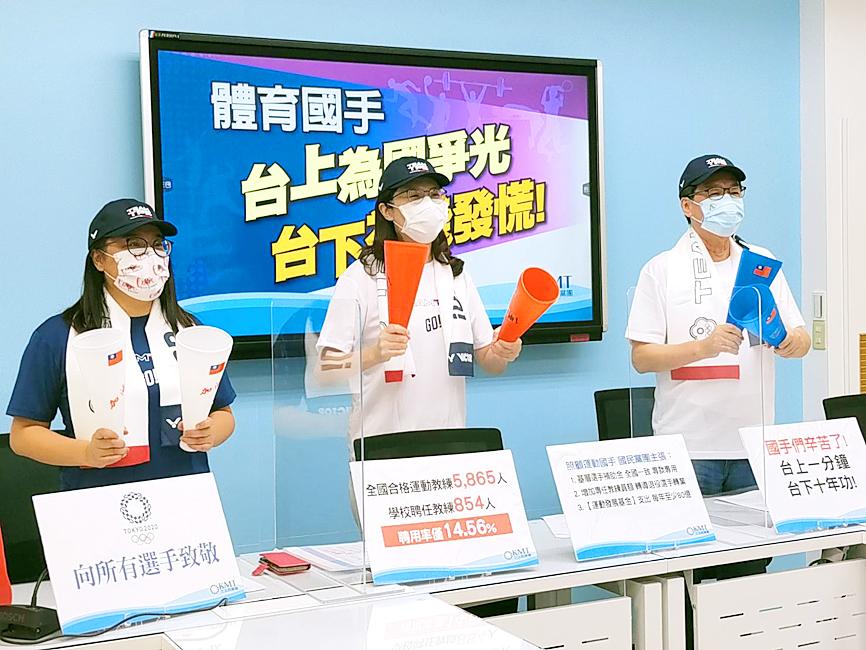The Sports Development Fund should receive at least NT$8 billion (US$285.66 million) each year, which should be evenly distributed among athletes nationwide, the Chinese Nationalist Party (KMT) said yesterday.
Currently the distribution of funds is uneven and insufficient to meet the needs of representative athletes, the KMT said.
The administration should increase the number of coaches available to athletes, and should provide guidance to retiring athletes to help them transition to other sectors, it said.

Photo courtesy to the Chinese Nationalist Party
KMT caucus secretary-general Cheng Li-wun (鄭麗文), caucus whip Alex Fai (費鴻泰) and KMT Legislator Jessica Chen (陳玉珍) made the comments yesterday during an online news conference.
“Lots of athletes leave their homes and move to the special municipalities to access resources, or they rely on their families to fund them,” Cheng said.
Mid-tier universities provide athletes with NT$500 to NT$8,000 per semester, while larger institutions provide NT$5,000 to NT$30,000 per semester, which is insufficient to meet training expenses, she said.

Photo: CNA
For living expenses, mid-tier universities provide monthly stipends of NT$1,000 to NT$3,000, while larger institutions provide NT$2,000 to NT$10,000, she said, adding that this does not cover living expenses, meaning athletes cannot wholly focus on training.
“On average, athletes training for the Olympics, the Asian Games or the Universiade only have about NT$15,500 per month,” Cheng said. “Reserve athletes have to make do with less — about NT$9,500 per month.”
Even those who win at international sporting events only receive an additional subsidy of NT$1,000 to NT$20,000 from the government, she said.
“Many professional athletes become coaches after their playing days are over, but of the 5,865 certified coaches nationwide, only 854, or 14.56 percent, have been hired by universities,” she said.
The government’s stipends for athletes were less than what a person could make at a part-time job, Chen said.
“How can we expect athletes to put aside their worries and focus on training when they are receiving so little help?” she asked.
President Tsai Ing-wen (蔡英文) in 2016 said that the government would double the budget for athletes every few years, but this has not happened, Fai said.
The Democratic Progressive Party said that the Sports Development Fund is 2.5 times bigger than it was before Tsai took office.
Sports Administration statistics show that NT$1.96 billion was budgeted for the fund in 2015, NT$2.39 billion in 2016 and NT$6.79 billion this year.
However, this is still insufficient for athletes’ needs, so the government should boost it to a minimum of NT$8 billion and for as much as NT$10 billion as Tsai promised, Fai said.
“The government should use tax breaks to encourage industry to sponsor athletes,” he said. “Our athletes’ performances at the Olympics is worth way more to the country than NT$8 billion.”
Additional reporting by Chien Hui-ju

An essay competition jointly organized by a local writing society and a publisher affiliated with the Chinese Communist Party (CCP) might have contravened the Act Governing Relations Between the People of the Taiwan Area and the Mainland Area (臺灣地區與大陸地區人民關係條例), the Mainland Affairs Council (MAC) said on Thursday. “In this case, the partner organization is clearly an agency under the CCP’s Fujian Provincial Committee,” MAC Deputy Minister and spokesperson Liang Wen-chieh (梁文傑) said at a news briefing in Taipei. “It also involves bringing Taiwanese students to China with all-expenses-paid arrangements to attend award ceremonies and camps,” Liang said. Those two “characteristics” are typically sufficient

A magnitude 5.9 earthquake that struck about 33km off the coast of Hualien City was the "main shock" in a series of quakes in the area, with aftershocks expected over the next three days, the Central Weather Administration (CWA) said yesterday. Prior to the magnitude 5.9 quake shaking most of Taiwan at 6:53pm yesterday, six other earthquakes stronger than a magnitude of 4, starting with a magnitude 5.5 quake at 6:09pm, occurred in the area. CWA Seismological Center Director Wu Chien-fu (吳健富) confirmed that the quakes were all part of the same series and that the magnitude 5.5 temblor was

The brilliant blue waters, thick foliage and bucolic atmosphere on this seemingly idyllic archipelago deep in the Pacific Ocean belie the key role it now plays in a titanic geopolitical struggle. Palau is again on the front line as China, and the US and its allies prepare their forces in an intensifying contest for control over the Asia-Pacific region. The democratic nation of just 17,000 people hosts US-controlled airstrips and soon-to-be-completed radar installations that the US military describes as “critical” to monitoring vast swathes of water and airspace. It is also a key piece of the second island chain, a string of

The Central Weather Administration has issued a heat alert for southeastern Taiwan, warning of temperatures as high as 36°C today, while alerting some coastal areas of strong winds later in the day. Kaohsiung’s Neimen District (內門) and Pingtung County’s Neipu Township (內埔) are under an orange heat alert, which warns of temperatures as high as 36°C for three consecutive days, the CWA said, citing southwest winds. The heat would also extend to Tainan’s Nansi (楠西) and Yujing (玉井) districts, as well as Pingtung’s Gaoshu (高樹), Yanpu (鹽埔) and Majia (瑪家) townships, it said, forecasting highs of up to 36°C in those areas